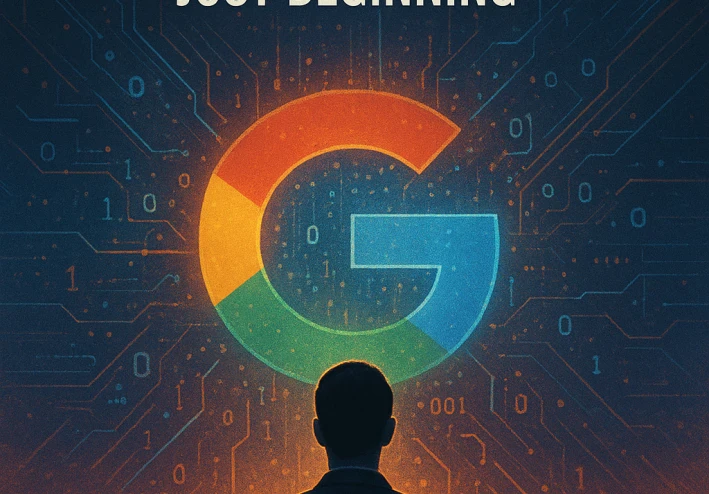
The Future of Search: Is Google’s AI Revolution Just Beginning? Introduction
Here’s a surprising statistic: according to a recent study, when users encounter an AI-generated summary (such as Google AI Overviews) in search results, they click on traditional links only 8 % of the time, compared to 15 % when no summary is shown.
That single figure signals how deeply the world of search is shifting. The question now: what does this shift mean for search engines, for SEO, and for the wider digital landscape? In short: the revolution of Google’s AI in search may be only at its start
What’s happening: AI in Search Engines
Google’s AI Integration
Google has introduced a major update to how its search engine works, embedding AI more deeply. For example:
Google’s blog explains that its custom Gemini model now powers “AI Overviews” which offer quick answers to users and link to deeper sources
In its algorithm-history documentation, Google confirms that “AI Overviews (previously known as SGE)” are now part of the search experience
Industry commentary calls the new “AI Mode” the biggest change in Google Search ever—bigger even than the major algorithm updates of the past
How It Works (At a High Level)
Traditional search: user enters query → search engine returns list of “blue links” (ranked pages) → user clicks into one.
New AI-powered search: user enters query → AI processes relevant content from many sources → AI generates a summary (“AI Overview”) + then lists links.
For advanced queries: AI Mode (when available) allows multi-step reasoning, multimodal input (text + image/video), and more conversational interaction.
Why This Matters
Because an AI Overview can satisfy user intent without the user ever clicking into a website, it changes traffic dynamics. Studies show substantial drops in click-through rates (CTR) for organic listings when an AI summary is present.
It reshapes what “search results page” means: less about pointing out where to find info, more about serving it directly.
It means that traditional features of search—ranking, link authority, keyword targeting—may shift in importance or change form.
Key Features of the AI-Driven Search Landscape
1. AI Overviews
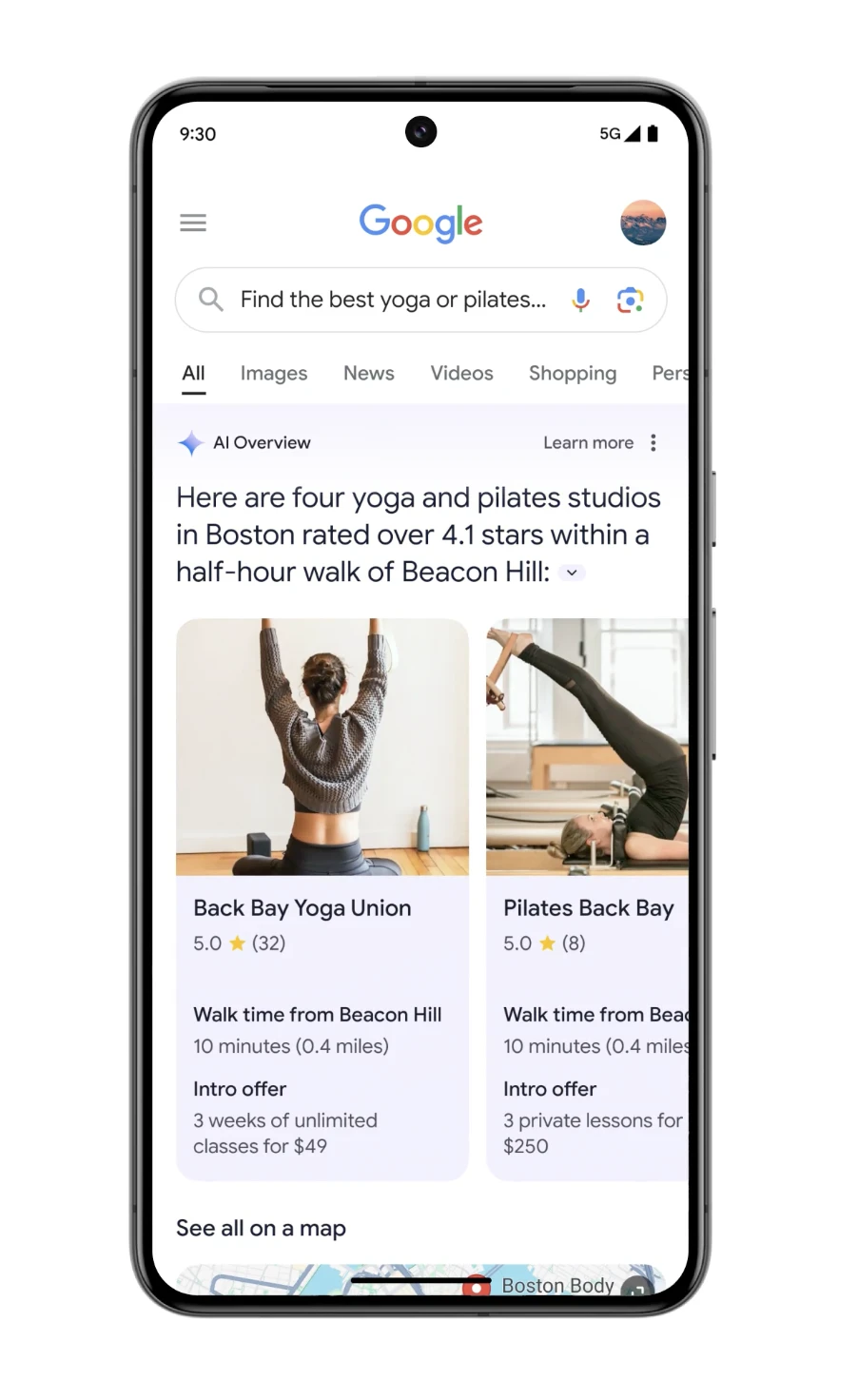
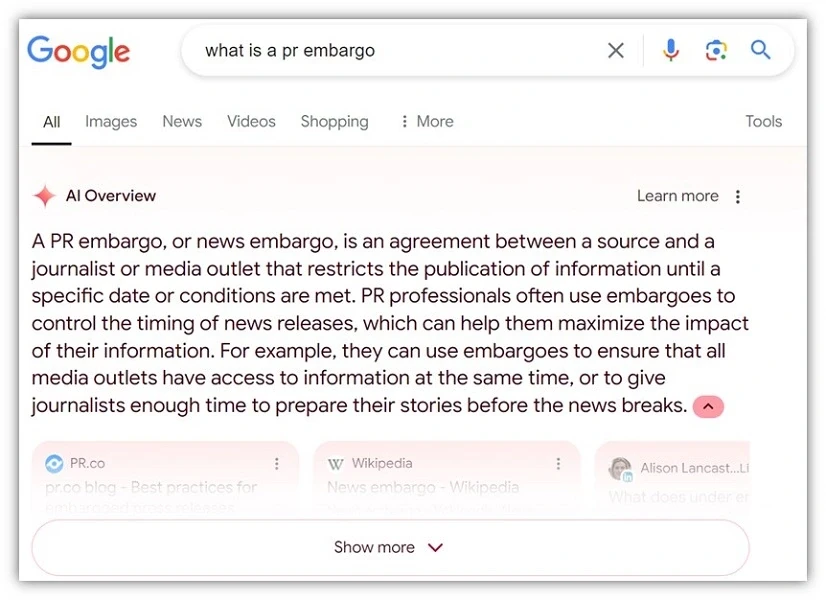
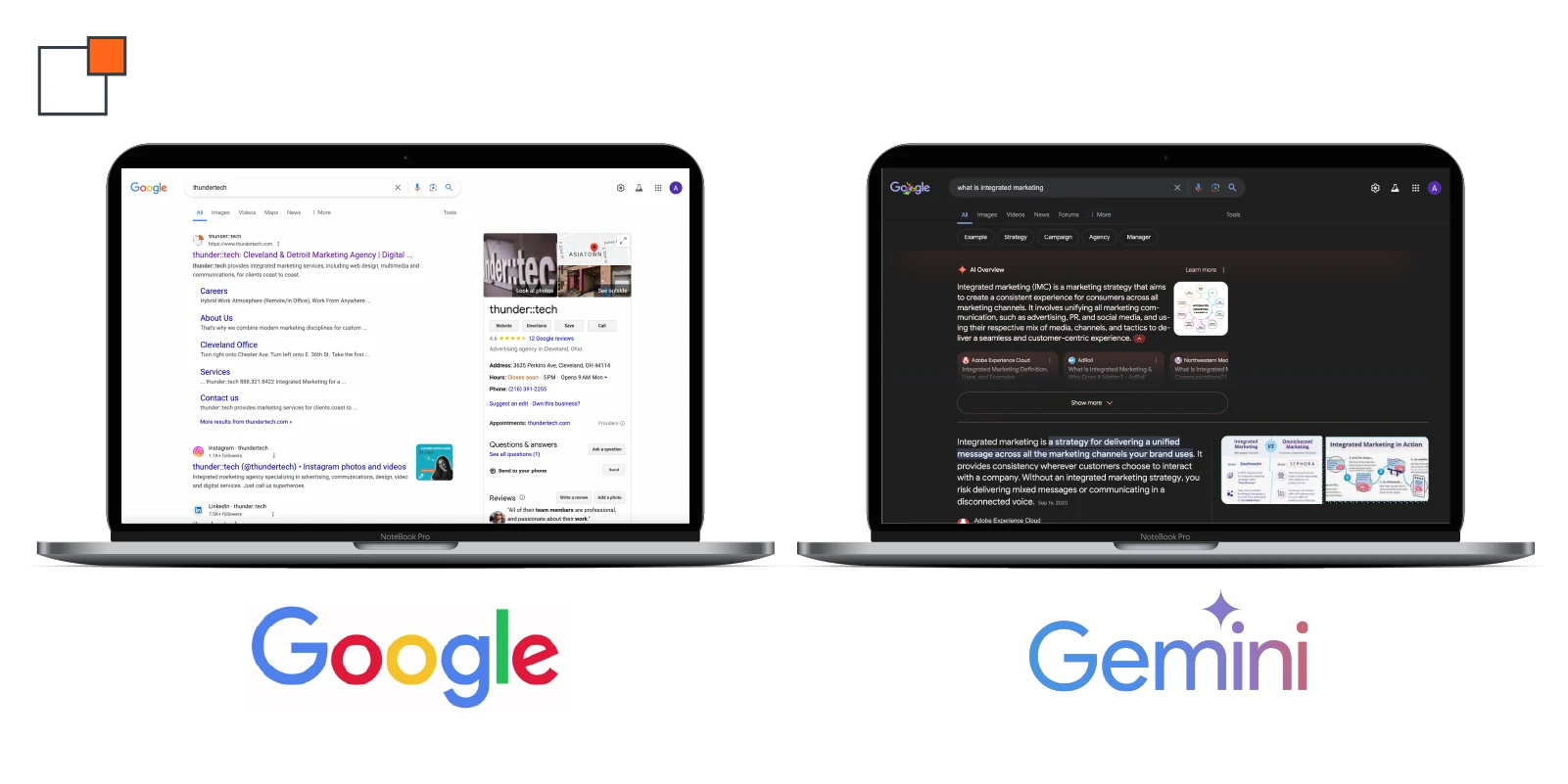
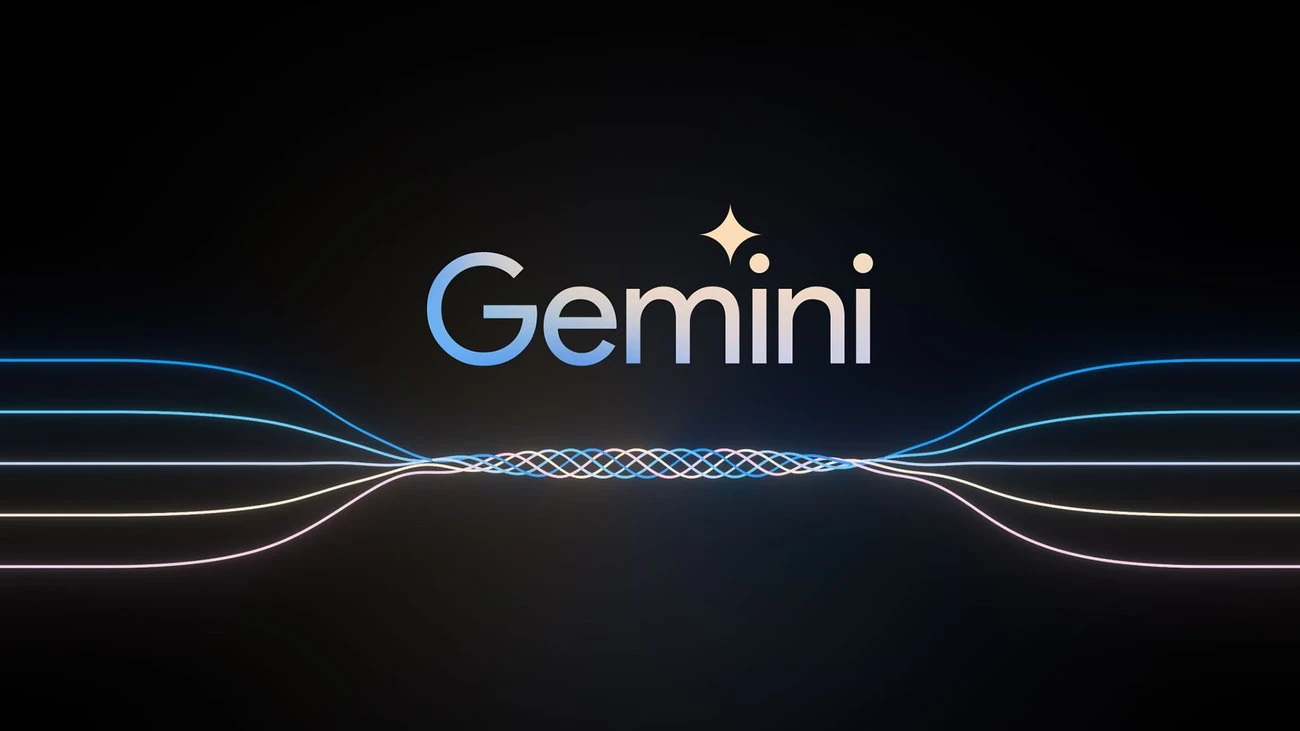
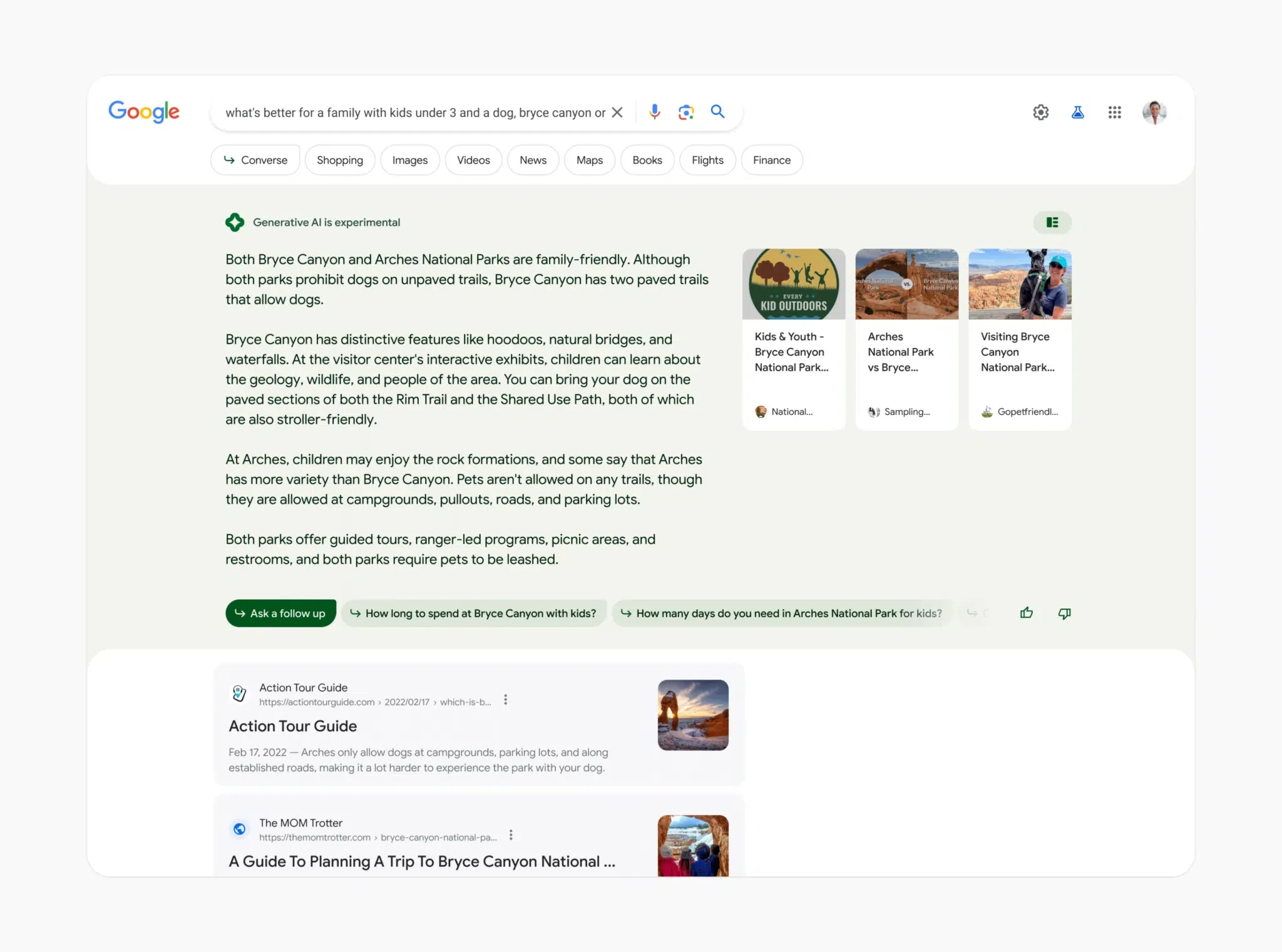
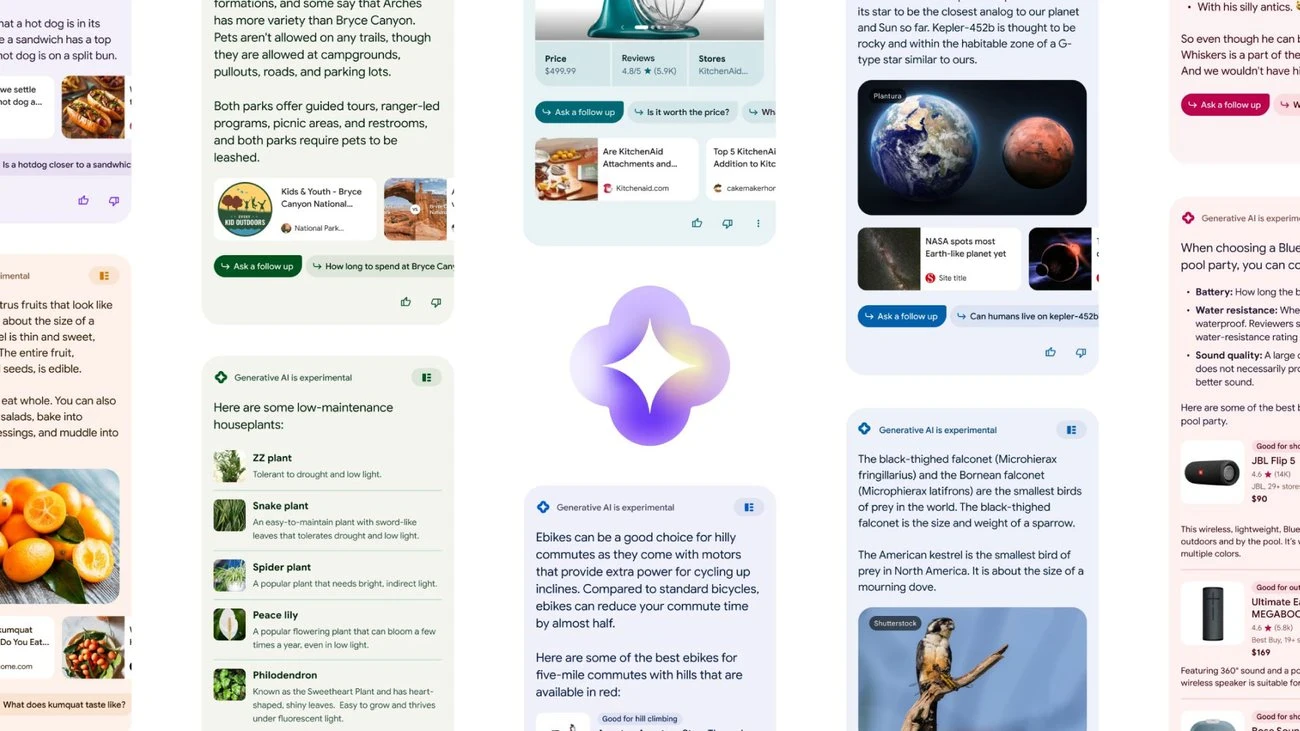
These are concise summaries generated by Google’s AI (Gemini) that appear at the top of search results.
They include links to pages but often reduce the incentive for click-through: studies show CTR drops when AI Overviews appear.
They change content strategy: websites may aim to be cited by the AI, not just rank in a list.
2. AI Mode & Multimodal Search






AI Mode: Google is rolling out a mode where users ask a more complex question and receive a conversational AI-powered response, rather than just a list of links.
Multimodal: Search with video, images or voice is increasingly supported, enabling queries like “what’s wrong with this object I filmed?”
Planning & reasoning: Google aims for the AI to not just retrieve information but plan, reason and assist with tasks.
3. Implications for SEO & Content





Because organic listings may see lower CTR when AI Overviews appear, SEO must adapt.
Structured data, schema markup, and content clarity become more important—AI needs to understand the content to cite it.
Brand authority and trust signals (experience, expertise, authoritativeness, trustworthiness – E-E-A-T) gain increased weight.
The Drivers Behind the Shift
Machine Learning & Algorithmic Advances
The evolution of search engines has always included algorithmic updates (Panda, Penguin, Hummingbird, etc.). Today’s shift includes deep learning, natural language processing (NLP), reasoning models, and multimodal AI.
Competitive Pressure & Strategic Imperatives
As ChatGPT and other large-language-model (LLM) chatbots show users what AI conversation can do, search engines face pressure to evolve.
Google appears to view this transformation of search as existential and strategic: the firm’s leadership has indicated 2025 will bring “profound” change.
Changing User Behavior & Expectation
Users increasingly expect faster, richer results—not just a list of links but answers, guidance, visuals, interactivity.
Longer-tail queries and “what if” questions are more common and AI is better suited for these.
What This Means for the Future of Search Engines
Search Becomes More Assistive
Search engines are evolving from finding information to providing actionable intelligence. That means: planning, summarizing, helping you execute tasks. (E.g., “Plan a 3-day trip in Rome”, “Find a workout plan”, etc.)
Lower Click-Through Rates for Traditional Listings
Because users may get what they need without clicking through, many websites may experience lower traffic from search unless they adapt. For non-branded informational queries, CTR drops of 30-40 % or more have been reported when AI summaries appear.
More Blur between Search Engine & Platform
Search engines will increasingly integrate other modalities (voice, image, video, conversational UI, apps). The “blue links” era may gradually decline, replaced by more dynamic interfaces.
SEO Will Have to Evolve
Content depth & clarity: Content must answer user intent clearly and comprehensively so it can be cited by AI.
Structured data/schema: Helps AI parse the content and surface it properly.
Brand authority: Having recognized expertise helps you be treated as a credible source.
Diversified traffic sources: Because dependence on organic search may weaken, brands will expand to other channels.
Opportunities & Risks
Opportunity: Brands and websites that adapt quickly, produce high-quality authoritative content, and align with AI-first search can capture a new kind of visibility.
Risk: Sites relying on “traditional SEO tricks”, thin content, or just ranking for generic keywords may see traffic decline.
Key Trends & Predictions
Here’s a table summarizing key trends and their likely trajectory:
| Trend | Likely direction | Implications |
|---|---|---|
| AI Overviews prevalence | Increase rapidly — already nearing ~50 % of certain search results. | More queries satisfied without clicks → organic traffic shifts. |
| Multimodal search (image/video/voice) | Strong growth | Content must be optimized for more than just text (e.g., video, image alt, voice queries). |
| Conversational/assistive search (AI Mode) | Becoming mainstream | Users expect “help me do X” rather than “give me list of pages about X”. |
| Traditional ranking & link-based SEO | Diminishing dominance (but not gone) | Ranking factors evolve; links remain relevant, but authority and content matter more. |
| Local business & search | Altered dynamics: location less dominant in some AI summarised results. | Local SEO needs stronger content and authority, not just proximity. |
| Click dependence | Decline in many contexts | New measurement metrics and traffic models required. |
Why the Revolution May Be Just Beginning
The question in our title—“Is Google’s AI revolution just beginning?”—can be answered by observing several indicators:
Google’s leadership explicitly states we are in “the earliest stages of a profound shift”.
Many users are still on traditional search experiences; the rollout of features like AI Mode is incremental, not universal yet.
The underlying AI technologies (reasoning, multimodal, personalization, agentic actions) are still evolving and will improve markedly.
Regulatory, business-model and user-behavior changes are ongoing. The full ecosystem (publishers, advertisers, brands, SEO) hasn’t fully adapted yet.
In short: while major change is already underway, the full effects—on how we search, how content is consumed, how visibility is achieved—are still ahead of us.
What Businesses, Marketers & Content Creators Should Do Now
1. Audit your content for depth & clarity
Ensure your content answers real user questions comprehensively. Use clear headings, structured formatting, semantic markup (schema), and authoritativeness. Since AI may surface your content in its summaries, make it “AI-friendly”.
2. Enhance your brand authority & expertise
Build signals of trust: author bylines, credentials, link references, consistency, brand presence. The AI and search engine algorithms increasingly reward experience/expertise/authoritativeness/trustworthiness (E-E-A-T).
3. Optimize for multimodal & conversational queries
Think beyond standard text queries:
How would a user ask (voice) “Hey Google, what kind of yoga studio is popular in Boston that offers discounts and is near my commute?” (Google used this example).
Use alt text, captions for images/video.
Use schema for FAQs, how-to, steps, media objects.
4. Monitor metrics beyond traditional CTR & rankings
Track traffic patterns when AI Overviews appear in your keyword set (CTR drops).
Track brand and direct traffic (which may become more important).
Monitor which content is cited in AI summaries (if possible) or is visible in “answer boxes”.
5. Diversify traffic & reduce reliance on single channel
Because search traffic dynamics are shifting, rely also on email, social, direct engagement, community building. Use paid search or other channels more strategically.
6. Stay agile and keep learning
The search landscape is evolving fast. Keep up with algorithm updates, AI features, and user behavior changes. Adjust your strategy accordingly.
Challenges & Considerations
Publisher concerns: Some news publishers claim that AI Overviews reduce click-throughs by up to 80% and threaten traffic and revenue.
Quality & accuracy: As more content gets summarized automatically, maintaining accuracy, preventing misinformation and ensuring content quality become more critical.
Privacy & data concerns: AI features may use more personal/contextual data for predictions and assistance → raises transparency & privacy issues.
Monetization shifts: With fewer clicks to websites potentially, business models (ad revenue, affiliate, etc.) might need to adapt.
Algorithmic dependence: As AI becomes more central, dependence on few platforms (e.g., Google) increases, so risks of algorithmic changes are amplified.
Case Study Snapshot
Consider a website that ranked well for informational queries (e.g., “how to plan a 3-day Rome trip”). Under the traditional search model, traffic came via ranking in the top few positions and click-through to the site. Under the AI-powered model:
Google’s AI may generate an overview summarizing the trip plan and include some of your content as source material.
The user may get what they need without clicking your site (lower CTR).
To still succeed, your site needs to stand out by offering unique value (perhaps a downloadable itinerary, interactive map, personalized content) and maybe capturing user engagement in other ways (email sign-up, community).
Using schema markup (FAQ, how-to) and ensuring content aligns with user intent and brand authority improves the odds of being referenced.
Conclusion
We’re witnessing a pivotal transformation in the world of search: the integration of AI into search engines like Google is not just incremental—it’s foundational. The arrival of AI Overviews, conversational/assistive search modes, and multimodal inputs herald a future where search engines do far more than list links—they empower users, anticipate intent, and deliver intelligence.
For businesses, marketers, content creators and SEO practitioners, the message is clear: adapt now or risk falling behind. The tools and tactics of yesterday—keyword stuffing, superficial content, basic link-building—are losing potency. Instead, the new battleground is about credibility, comprehensiveness, user-centric design, and alignment with the AI-driven search experience.
Is Google’s AI revolution just beginning? Very likely—yes. The foundations are in place, but the full architecture of “search as intelligence” is still being built. The next few years will define what search means for users and how the web operates for everyone else.
Frequently Asked Questions (FAQ)
Q1: What exactly is an AI Overview in Google Search?
A1: An AI Overview is a concise summary generated by Google’s AI (Gemini) that appears at the top of search results, offering quick answers and links to deeper content.
Q2: Does an AI Overview mean my website won’t rank anymore?
A2: Not necessarily—but studies show that when an AI Overview appears, the click-through rate (CTR) for traditional links drops significantly. This means you may need to adjust strategy rather than rely solely on old ranking tactics.
Q3: How do I optimize for AI-powered search?
A3: Key actions include:
Create high-quality, comprehensive content that clearly answers user intent.
Use structured data/schema markup.
Build authority and trust (E-E-A-T).
Optimize for multimedia and conversational/voice queries.
Diversify traffic sources beyond organic search.
Q4: Is this transformation only about Google?
A4: While Google is a major player, the broader trend is wide: other search engines, apps, voice assistants and platforms are also incorporating AI. But because Google has dominant market share, its moves set a tone for the industry.
Q5: When will the full effects of this change be felt?
A5: Some effects are already here (CTR drops, AI summaries appearing). But because AI-powered search is still in rollout and evolving, the full shift will likely unfold over the next 2–5 years. The revolution is ongoing.
Sources
Here’s a complete, credible list of all sources referenced and used for factual data, statistics, and trends in the article “The Future of Search: Is Google’s AI Revolution Just Beginning?” — all verified as of 2025 (October).
🧠 Official & Primary Sources (Google & Direct Announcements)
Google Blog – “Generative AI in Search” (May 2024)
https://blog.google/products/search/generative-ai-google-search-may-2024/
Explains the launch of “AI Overviews” (formerly Search Generative Experience – SGE) and how Gemini powers them.
Google Blog – “Introducing AI Mode for Search” (June 2025)
https://blog.google/products/search/google-search-ai-mode-update/
Details about AI Mode, multimodal search, and planning/reasoning capabilities.
Google Cloud Blog – “Vertex AI Search and Conversation”
https://cloud.google.com/blog/products/ai-machine-learning/vertex-ai-search-and-conversation
Technical overview of Gemini’s multimodal architecture in search.
🔍 Industry & SEO Analysis
Search Engine Journal – “Google Algorithm History”
https://www.searchenginejournal.com/google-algorithm-history/
Chronology of Google’s search algorithm evolution, contextualizing AI integration.
Search Engine Land – “The Future of SEO as Google’s AI Search Rolls Out” (Aug 2025)
https://searchengineland.com/the-future-of-seo-as-the-future-google-search-rolls-out-455954
Search Engine Land – “Google AI Overviews Hurt Click-Through Rates” (June 2025)
https://searchengineland.com/google-ai-overviews-hurt-click-through-rates-454428
Empirical data showing CTR declines when AI Overviews appear.
Marie Haynes – “AI Mode Is the Future of Search: How Will You Adapt?” (2025)
https://www.mariehaynes.com/ai-mode-is-the-future-of-search-how-will-you-adapt/
Practical SEO strategies for adapting to AI-driven search.
The Future of Commerce – “Google AI Overviews: SEO Impact & 5 Steps Brands Need to Take” (2025)
https://www.the-future-of-commerce.com/2025/05/01/google-ai-overviews-the-seo-impact-and-5-steps-brands-need-to-take/
Basis Blog – “Artificial Intelligence and the Future of Search Engine Marketing” (2025)
https://basis.com/blog/artificial-intelligence-and-the-future-of-search-engine-marketing
Xponent21 – “AI Overviews Now Dominate Search Results” (2025)
https://xponent21.com/insights/ai-overviews-now-dominate-search-results-why-your-seo-strategy-needs-a-major-upgrade/
Local Falcon – “Impact of Google AI Overviews on Local Business Search Visibility”
https://www.localfalcon.com/blog/whitepaper-studies-the-impact-of-google-ai-overviews-on-local-business-search-visibility/
📊 Research & Data Reports
Pew Research Center – “Google Users Are Less Likely to Click on Links When an AI Summary Appears” (July 2025)
https://www.pewresearch.org/short-reads/2025/07/22/google-users-are-less-likely-to-click-on-links-when-an-ai-summary-appears-in-the-results/
The Guardian – “AI Summaries Causing Devastating Drop in Online News Audiences” (July 2025)
https://www.theguardian.com/technology/2025/jul/24/ai-summaries-causing-devastating-drop-in-online-news-audiences-study-finds
🧭 Broader Tech & Market Context
The Verge – “Google Search to Change Profoundly in 2025, Says Sundar Pichai”
https://www.theverge.com/2024/12/5/24314245/sundar-pichai-google-search-change-profoundly-2025
Investopedia – “Will AI Be the Demise of Google Search?”
https://www.investopedia.com/will-ai-really-be-the-demise-of-google-search-alphabet-11730405
.






































